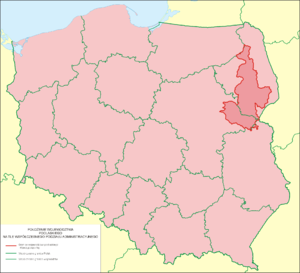South Podlasie
|
Podlachia Podlasie |
||
|---|---|---|
|
||
 Podlachia Proper |
||
| Country |
|
|
| Former capital | Drohiczyn | |
| Time zone | CET (UTC+1) | |
| • Summer (DST) | CEST (UTC+2) | |
Podlachia or Podlasie, (Polish: Podlasie, Belarusian: Падляшша Padliašša) is a historical region in the eastern part of Poland. Between 1513 and 1795 it was a voivodeship with the capital in Drohiczyn. Now the part north of Bug River is included in the modern Podlaskie Voivodeship with the capital in Białystok.
The region is called Podlasie, Podlasko or Podlasze in Polish, Palenkė in Lithuanian, Padliašša (Падляшша) in Belarusian, Pidlissja (Підлісся), Pidljasije (Підлясіє), Pidljaššja (Підляшшя) or Pidljaxija (Підляхія) in Ukrainian, Podljas’e (Подлясье) in Russian, "Podlyashe" (פּאָדליאַשע) in Yiddish, and Podlachia in Latin.
There are two opinions regarding the origin of the name of the region. Commonly people derive it from the Slavic word les or las meaning "forest", i.e., it is an "by the wood(s)" or "area of forests", making Podlachia close in meaning to adjacent Polesia. The theory has been questioned, as it does not properly take into consideration the vowel shifts "a" > "e" > "i" in various Slavic languages (in fact, it mixes vowels from different languages).
The second opinion holds that the term comes from the expression pod Lachem, which may be translated literally as "under the Poles" (see: Lechia). Some claim it to mean "under Polish rule", though in the Middle Ages Podlachia was only partially under Polish rule, and since 1446 until 1569 the area belonged to the Grand Duchy of Lithuania. A better variant of this theory holds that the name originates from the period when the territory was within the Trakai Voivodeship of the Grand Duchy of Lithuania, along the borderline with the Mazovia province, primarily a fief of the Poland of the Piasts and later on part of the Kingdom of Poland of the Jagiellons. Hence pod Lachem would mean "near the Poles", "along the border with Poland". The historical Lithuanian name of the region, Palenkė, has exactly this meaning.
...
Wikipedia

